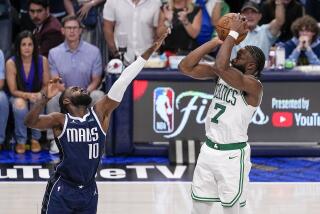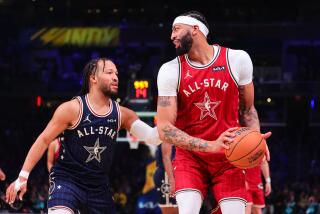Bird Is Back, So Are the Celtics
- Share via
BOSTON — It was not easy being Larry Bird -- ankles aching, team slumping, career in eclipse. See, Bird did not just put up the points and whatever else happened to the club, OK, happened. Bird and the Boston Celtics were one and the same. Bird carried the Celtics, sometimes as easily as a basketball tucked under his arm. It made sense, then, that when the team began to fade, it was not just the Celtics who were facing a gloomy future; Bird was, too.
Bird, of course, would not acknowledge this. He’s a Hoosier. He has never used a paragraph where a syllable would do. There still is the story about the time Bird was awarded his third Most Valuable Player trophy in 1986, and someone asked him: “That must make you feel great.”
Bird stared -- face blank, eyes cast downward.
“Yup.”
Now, Bird still pulls the shade down on his emotions and frustrations, but he can’t’ stop people from reading facts: painful bone spurs in his ankles shelved him for all but six games last season, and after eight Atlantic Division titles in nine years the team tumbled into third place. Suddenly, the adjective that was applied most to the Celtics was “aging.”
“Aging Celtics” appeared so often in newsprint, you would think the club had moved north from Boston to a busy Massachusetts suburb -- Aging.
As for Bird, himself, everyone just sort of forgot. It used to be, “Who’s better, Magic or Bird?” There was never anyone else. Magic Johnson or Larry Bird; that was it. But then along came Michael Jordan and Charles Barkley, and Bird slipped out of the multiple choice. Larry Bird -- hero, star, MVP -- became just a write-in candidate.
Naturally, the question was how Bird was going to deal with all this, whether he would drift gracefully into memory or go one-on-one with his own mortality, step back and put up a three-pointer. Bird -- big surprise -- does not buy this theory, but this much we do know:
He made the shot. He hit nothing but net.
If the Celtics and Bird haven’t exactly climbed all the way back to the top of the mountain, at least they are still on the way up. They have passed the New York Knicks, their opponent Sunday on the fabled parquet of the Boston Garden. Even the Philadelphia 76ers, good as they are, remain within a tantalizing reach, a possibility that was far-fetched as recently as last month.
“We still have a long way to go,” Bird said, with as much insight as he cares to offer. “But we’re getting there. We’re getting better.”
To no one’s surprise, Bird has orchestrated the comeback. He shot poorly in the first half of the season, and Bird shooting poorly is like Liberace stumbling over “Chopsticks.” But since the All-Star break, he is averaging more than 29 points a game. In one recent six-game stretch, he looked not like an old Bird, but like the old Bird.
He shot 15 for 21 against Philadelphia, grabbed 10 rebounds, added four assists and totaled 41 points; two nights later, he shot nine for 14, had 11 rebounds, seven assists and 22 points against the Atlanta Hawks; the night after that, he was nine for 21 with 10 rebounds, eight assists and 21 points against the Dallas Mavericks, then 19 for 33, 10 assists and 46 points against the Orlando Magic; eight for 15, 18 rebounds, 11 assists and 29 points against the New Jersey Nets; and 11 for 16, 10 rebounds, 16 assists -- one shy of his career record -- and 25 points against the Cleveland Cavaliers.
“I’ve been shooting the ball better than I was the first half of the season,” Bird said. “I wasn’t shooting the ball good at all. Everyone could see that.”
What they could not see was the disappointment building to anger, because either it did not exist or because Bird would not let them see it. He can be impatient and rude, and he still dodges the most innocent questions as if they were arrows.
“When did you feel the shooting touch start to come back, Larry?”
“I don’t know. Just came.”
“How long have you felt in a groove, Larry?”
“Been awhile.”
Bird shrugs as if to say, hey, people have slumps all the time, no big thing. But it was.
After all, Bird was coming off surgery to remove bone spurs on both heels; he still is required to ice his right ankle after each game. Plus, Coach Jimmy Rodgers had installed a new offense that valued ball movement above all else. The strategy forced Bird out to the perimeter, passing instead of shooting. His playing time was cut, too, sometimes to as little as 28 minutes a game.
He didn’t like it. Worse, he played like he didn’t like it.
“More than anything, I felt getting over the injury would take some time,” Rodgers said. “I thought that it would be a while before he’d be back at full strength. People expected him to come back like nothing happened, that he’d be the same old Larry. They expected too much.”
Rodgers says that Bird handled the awkward situation with “great heart,” but he’s been trying all season to reach a truce with Bird, the team is rolling now and there’s no point in stirring up the whole mess again. But there was a time when you could look down the bench and see the tension.
To be fair, Rodgers had a delicate decision to make. He could either let Bird be Bird, or he could begin to gently reconstruct a team that was beginning to creak and sway. Even now -- with Bird, Kevin McHale, Dennis Johnson and Robert Parish -- the Celtics put four players on the floor who are 32 or older.
Bird did not see it that way. Just 10 games into the season, in a 103-86 loss to the defending champion Detroit Pistons, he kept moving the ball on the outside, kept passing up shots, kept dumping the ball off. Asked later about it, he snapped: “I’m just a point forward.”
In 32 of his first 44 games this season, Bird scored fewer than his career average of 25.0 points. At the time he was named to the All-Star team in an outpouring of fan sentiment, Bird’s field-goal percentage was .457, the lowest of his career. Earlier, he had complained that the veterans were not playing enough, railing to the Boston Globe:
“If you have five or six guys who play hard and get the job done, I’d play them until they fell over.”
It sounded like a slap at Rodgers. Then a week after that, on Dec. 20, the Boston Herald published a story about dissension on the club. The headline read, “Bird is the Root of Evil on Celtics.”
He appeared to have lost it. There was the night, early in the season when he shot four for 13 and scored a measley 12 points against the Charlotte Hornets. In one three-game span, he scored 10, 12 and 11 points, and all together that was once a night’s work for him. Later, he would shoot five for 15 against the Miami Heat, nine for 23 against the Denver Nuggets, nine for 25 against the Knicks.
“Larry’s a tough guy to read,” Celtics assistant coach Chris Ford said. “He keeps you guessing. He keeps you on your toes. If you asked him, he’d probably say, he never worried about it. But easy for him? To someone who always shot well, who never had problems with that, to all of a sudden go through it -- do you think it was easy?”
Said Johnson: “Larry’s like everybody else. I mean, he’s a unique player and all, but who knew if the shooting was going to come back for him?”
Slowly, though, Bird began to win all the little battles with Rodgers, convincing the coach to let him shoot more and play more. Over the last two months he is averaging more than 40 minutes a game, shooting 50 percent and his performance speaks for itself: 43 points against the Nets, 46 against Orlando, 33 points -- and a career-high five blocked shots -- against Detroit.
That last game, March 30, featured a sequence that Bird shook out from a time capsule. Third quarter, Pistons ahead, 59-58. Bird 16-foot jump shot with 9:11 left. Then a Bird layup, and a Bird block of Dennis Rodman at the other end. Minutes later, a Bird 19-foot jump shot, a Bird 12-footer from the baseline, a Bird 20-footer from outside and with 1:18 left, a Bird three-pointer.
In a span of 7:53, Bird scored 13 of his team’s 24 points, blocked a shot and the Celtics turned a one-point deficit into an 82-75 lead; they won. It was Bird, vintage ’84.
He has stayed hot, too. About all that has not thawed is Bird, himself. Asked how frustrated he’d grown while struggling early in the season -- easy question, really -- Bird didn’t just close the door again; he slammed it shut.
“Oh, yeah, I was frustrated,” he said, the Indiana twang dripping sarcasm. “I don’t make enough money, I stay in the crappiest hotels in the world and I have to play this damn game for a living. I was real frustrated. Right.”
And there was the game last month in Philadelphia, one of the few potholes in the Celtics’ road back into contention. They were down by 18 points in the third quarter enroute to absorbing a 122-104 blowout, when Rodgers called a timeout. At center court the 76ers’ mascot choreographed a skit right out of baggy-pants burlesque.
A man wrapped in a Celtics jacket was bound and gagged, tossed into a chair and flanked by two men. One crashed his cymbals into the prisoner’s ear while the other punched him with a boxing glove strung to the end of a slide trombone, all to the sound of French can-can music.
The message was clear: The Celtics were getting pounded. Even a few of the players looked over from the bench to laugh at the scene. Johnson was hysterical. But when Bird glanced up, you could have used his eyeballs for ice cubes.
Of course, Bird and the Celtics rebounded from the loss. They’re still in the hunt. The players are old and slow, but now they’re coping, drawing on their experience and relying on the cohesion that’s been built over a decade. Who knows?
More to Read
Go beyond the scoreboard
Get the latest on L.A.'s teams in the daily Sports Report newsletter.
You may occasionally receive promotional content from the Los Angeles Times.










